How much of your week gets spent digging through inboxes, updating trackers, or chasing down notes? For most venture capital (VC) teams, it’s more than they’d like to admit.
A VC tech stack should keep your work organized. The best tools get out of the way so you can focus on sourcing, reviewing, and supporting companies.
This list isn’t bloated with trendy apps. It’s a rundown of tools that help you stay organized, work faster, and avoid the common issues that slow teams down.
What Functions Should Your VC Stack Cover?
Before proceeding to the list, let’s break down the core functions of a VC tech stack. When these pieces come together, you’ll be building an efficient tech stack that gives your team a competitive edge.
Deal Sourcing
You need tools that help you spot standout companies early. Whether you’re tracking warm intros or watching industry trends, your system should give you a clear edge.
A solid market intelligence platform helps you surface deals before they hit everyone’s radar.
Due Diligence
Once a deal is on the table, you need a way to dig into the data. You want tools that help you analyze data, evaluate teams, and verify traction.
A flexible business intelligence tool lets you explore market signals, compare benchmarks, and make calls under pressure.
Relationship Intelligence
In the VC ecosystem, warm access is the currency. You should know exactly who on your team connects to which limited partners (LPs), founders, or fellow investors.
That relationship context becomes a strategic asset when sourcing deals or co-leading rounds.
Portfolio Management
Once you write the check, the real work starts. You need visibility across portfolio health, cash flow, and upcoming raises.
Smart reporting tools give you current metrics and reduce the manual lift that slows down fund management.
Fund Admin & Investor Relations (IR)
LPs expect speed, structure, and transparency. Modern IR tools support capital calls, document distribution, and updates around managing equity.
That structure supports cleaner operations and tighter communication.
Internal Collaboration
Shared workspaces help your team stay aligned without constant check-ins. That kind of setup supports real operational efficiency and helps everyone stay focused on strategic work.
AI & Automation
Repetitive tasks eat time. Automation can link your calendar, CRM, and pipeline so updates happen without manual work.
When paired with a business intelligence tool or natural language processing, it gives your team more signals without hiring another person.
6 Top Tools to Build a High-Performing VC Tech Stack
Now that you know what to cover, let’s look at the tools that can handle each part of your VC tech stack.
1. Village: Best for Deal Sourcing & Relationship Intelligence
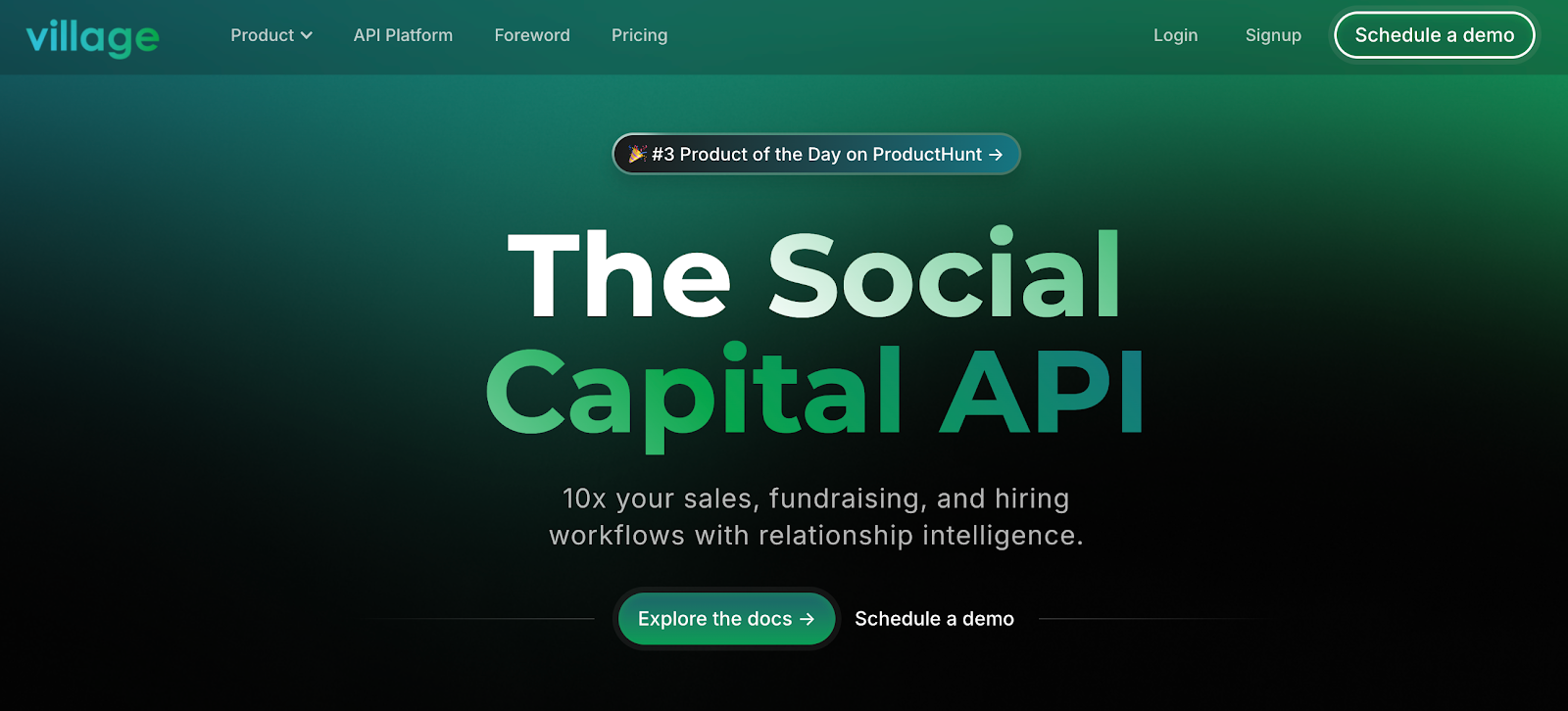
Village helps VC firms improve deal sourcing by turning cold outreach into trusted introductions. It maps your contacts, calendars, and inbox history to surface warm intro paths across your network. Village gives your team better access to promising startups without wasting time.
The platform functions as a network-aware layer within your customer relationship management (CRM) or deal flow management system. It uses relationship data, past meetings, and shared connections to flag intro paths with the highest trust.
Key Features
- AI-powered network graph from calendar, email, and CRM data
- 700M+ professional profiles and 30M+ private companies
- Ranked warm intros with built-in email templates
- Team boards for intro tracking and internal coordination
- One-click integration into your tech stack
You also need quality data when you back portfolio companies. Village verifies shared investments, co-investors, and past collaborations. Encryption and privacy controls satisfy venture capitalists who handle sensitive cap table and fund performance details every day.
Pricing Information
- Free trial: Searching through 700M+ people and 30M+ companies, 10 AI searches
- Essentials ($19/month): Includes unlimited AI search, investor access, three warm paths per contact.
- Pro ($39/month): This plan includes team collaboration features and allows up to six warm paths per contact.
- Premium ($119/month): This option provides unlimited warm introductions, full access for your entire team, and an optional application programming interface (API).
Does your deal flow depend on trusted connections? Village is one of the best deal-sourcing tools that you can use. It adds the relationship layer your VC tech stack is missing.
Schedule a demo or try it for free!
2. Crunchbase: Best for Due Diligence & Market Research
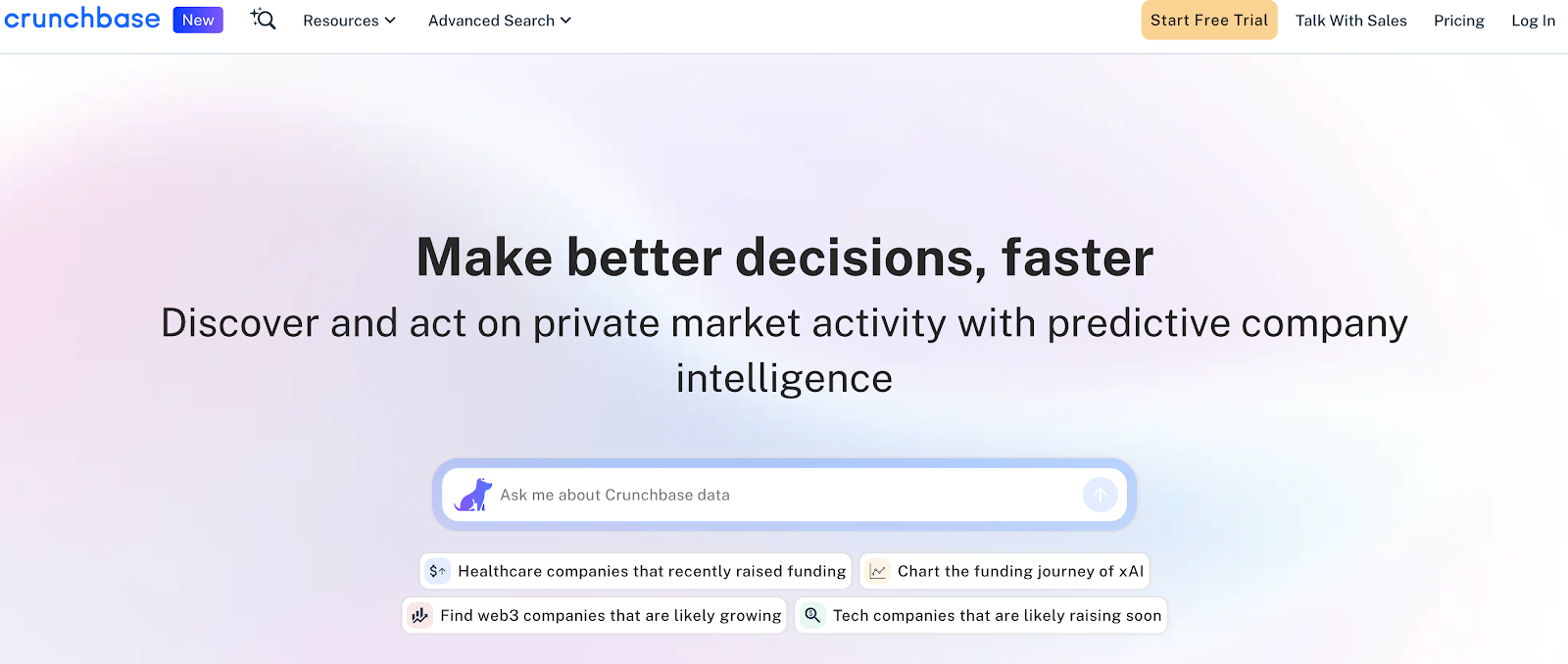
Before you move a deal forward, you need a clear picture of the company. Crunchbase gives you real-time access to funding rounds, leadership changes, and market activity across public and private companies. It’s one of the few deal sourcing platforms that combines data from over 80 million users with predictive AI.
Think of Crunchbase as a daily-use research engine for venture capital teams. You can track company performance, compare similar deals, flag investor overlaps, and follow the momentum behind emerging technologies.
Its data analytics features help you spot patterns and shift focus before the pitch even hits your inbox.
Key Features
- Detailed company profiles with funding data, revenue trends, and firmographics
- AI-powered predictions and performance graphs for better market analysis
- Search builder with deep filters across location, industry, funding stage, and more
- CSV export for up to 2,000 rows, useful for offline analysis and portfolio management tools
- Stages a kanban board to help track pipeline status and relationship history
Pros
You get a reliable hub for research without toggling between databases. It gives your team one source of truth across deal flow, LP updates, and pipeline reviews.
Cons
Some profiles lack depth, especially on early-stage companies, and the free version limits data access and exports.
Pricing Information
- Pro ($79/month): Includes advanced search tools, access to expanded company data, and funding alerts to support daily due diligence workflows.
- Business ($199/month, billed annually only): Adds company performance predictions, scalable search workflows, and higher export limits for growing venture capital firms.
3. Tactyc by Carta: Best for Portfolio Management
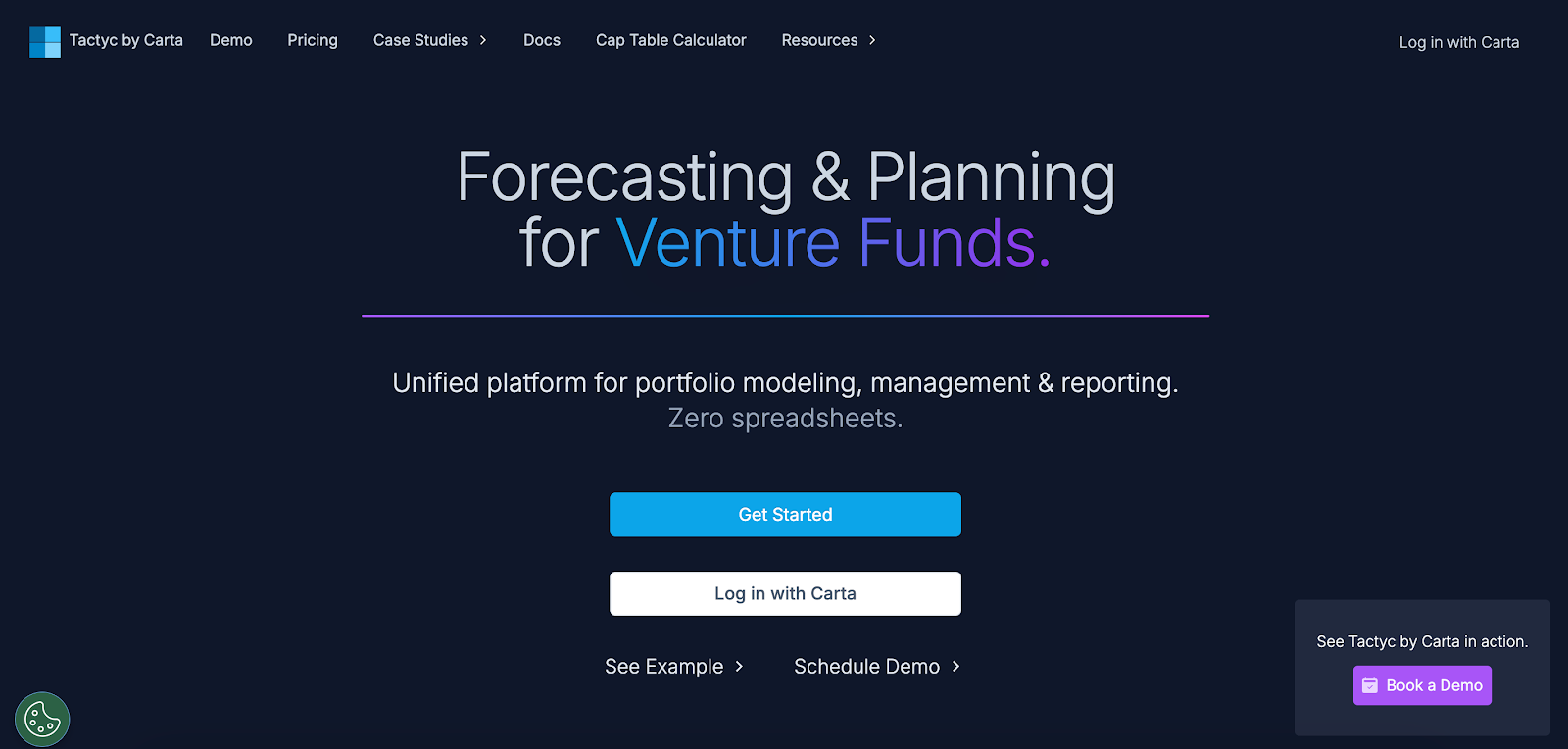
You’ve vetted the deal with Crunchbase. Now you need to see how it shapes your fund model. Tactyc by Carta brings forecasting, scenario modeling, and real-time portfolio management into one dashboard.
The platform links directly to cap tables in Carta. If a portfolio company raises a new round or changes structure, your model updates automatically. That live connection helps you track fund performance against your original plan and decide when to double down or when to walk away.
Key Features
- Market benchmarks that ground portfolio construction in actual round sizes and valuations
- Direct cap table sync to cut manual data entry and maintain accuracy
- Reserve planning with adjustable check sizes for different investment types
- Scenario modeling to test dilution and return outcomes before wiring funds
- Performance tracking that compares planned versus actual results across portfolio companies
Pros
Real-time data gives you clear sightlines on cash reserves and dilution risk, which tightens your investment strategies and LP updates.
Cons
Team members unfamiliar with Carta’s equity terms may need a short ramp-up to read the graphs.
Pricing Information
- Pricing isn't available to the public.
4. Allvue: Best for Fund Admin & Investor Relations
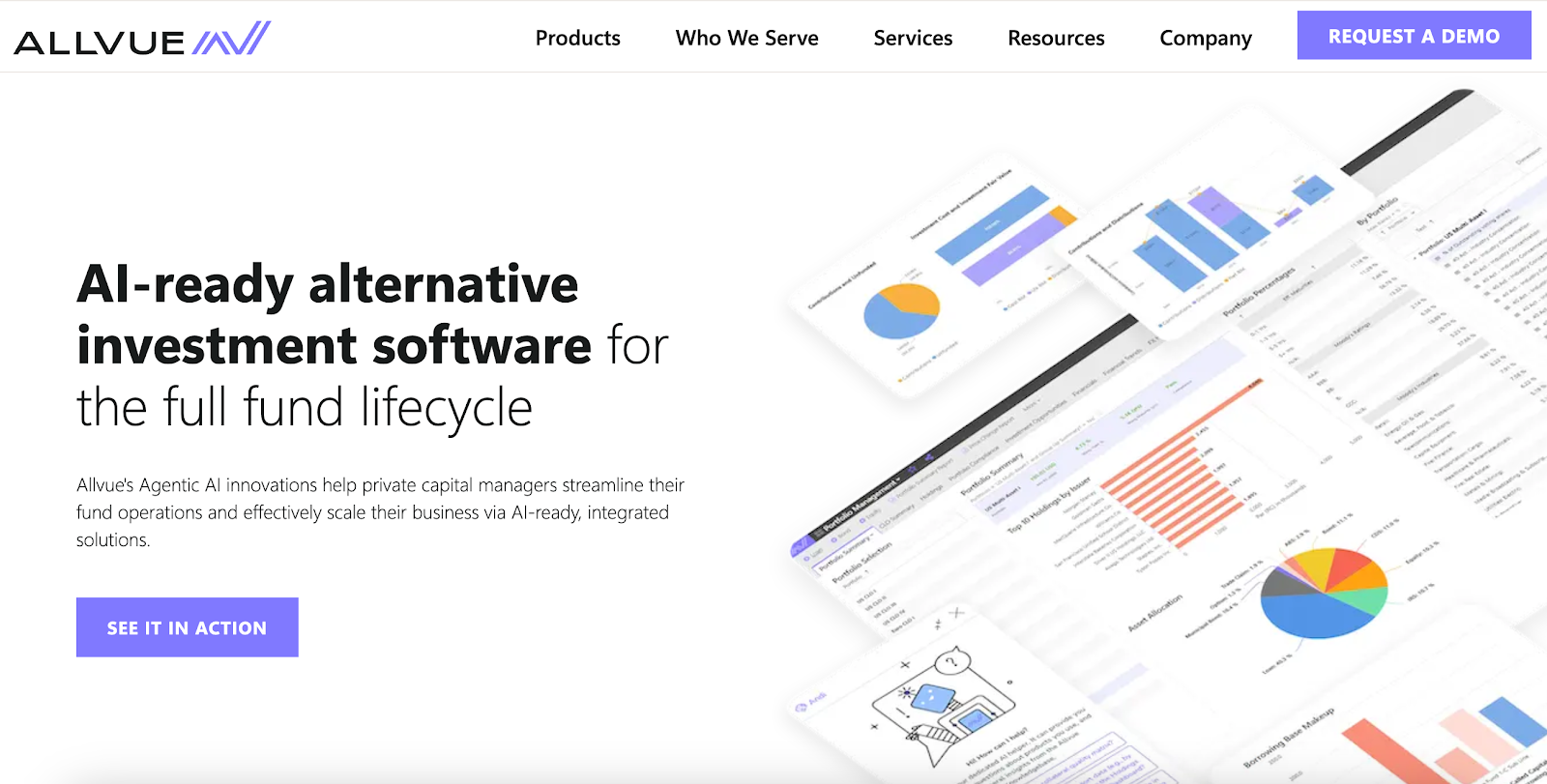
Once your investments are in motion, Allvue helps you keep the back office clean and the LPs updated without delays. It’s built for VC firms managing complex fund structures and private equity-style reporting cycles.
When you're fielding questions about ownership, capital calls, or exposure, this platform gives you what you need without second-guessing spreadsheets.
Allvue consolidates fund administration, accounting, and investor reporting into a single system. You can manage capital markets data, track exposure across funds, and deliver updates to LPs using one accurate financial reporting platform.
Key Features
- Real-time fund finance dashboards for borrowing bases and investor exposure
- Cloud-based general ledger, cap table sync, and cash management
- Investor portal with customizable dashboards and self-service reports
- Role-based controls and audit trails that support regulatory compliance
- Custom report writer for detailed LP statements and data-driven decisions
- Built-in workflows to support multi-fund VC operations at scale
Pros
The platform reduces reporting time, brings structure to complex fund flows, and supports clean handoffs across finance, compliance, and investor relations.
Cons
Pricing may be steep for smaller funds, and the full feature set takes time to implement without a dedicated back-office team.
Pricing Information
- No public pricing is available.
5. Notion: Best for Internal Collaboration
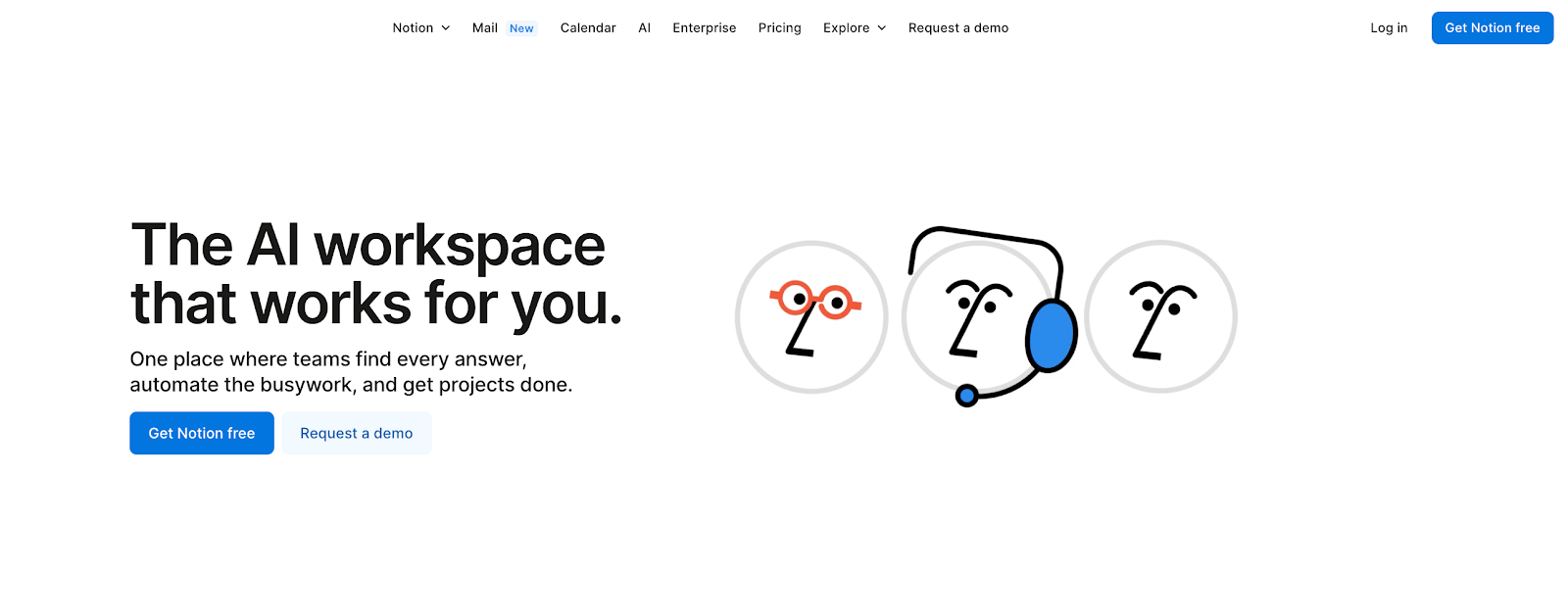
Your team needs a central place to plan, write, track, and stay aligned. Notion gives you exactly that. It’s flexible enough for personal notes, yet structured enough to handle team-wide task management, meeting prep, and knowledge management.
Notion works for VC teams who want a shared workspace for deal notes, diligence documents, weekly agendas, and internal memos.
Key Features
- Customizable pages for meeting notes, memos, and deal reviews
- Databases with flexible views (tables, boards, calendars) to manage pipeline or back-office workflows
- Notion AI for text generation, summarization, and database autofill
- Embedded content support for pitch decks, data rooms, or live docs
- Slack, Google Drive, and calendar integrations for broader internal team coordination
- Permissions and real-time collaboration for partner alignment
- Automation tools to reduce repetitive manual updates across your VC operations
Pros
You can use one tool for docs, notes, task tracking, and deal pipelines. It adapts to your process, so you don’t need to switch platforms to stay on top of projects.
Cons
The more you build, the more upkeep is required. Without structure, it’s easy for workspaces to become cluttered or duplicative.
Pricing Information
- Plus ($12 per member/month): Best for small teams that need shared documentation and flexible organization.
- Business ($24 per member/month): Supports larger teams with advanced permissions and scalable collaboration.
- Enterprise (custom pricing): Built for organizations that need additional controls, audit tools, and data management features.
6. Zapier: Best for AI and Automation
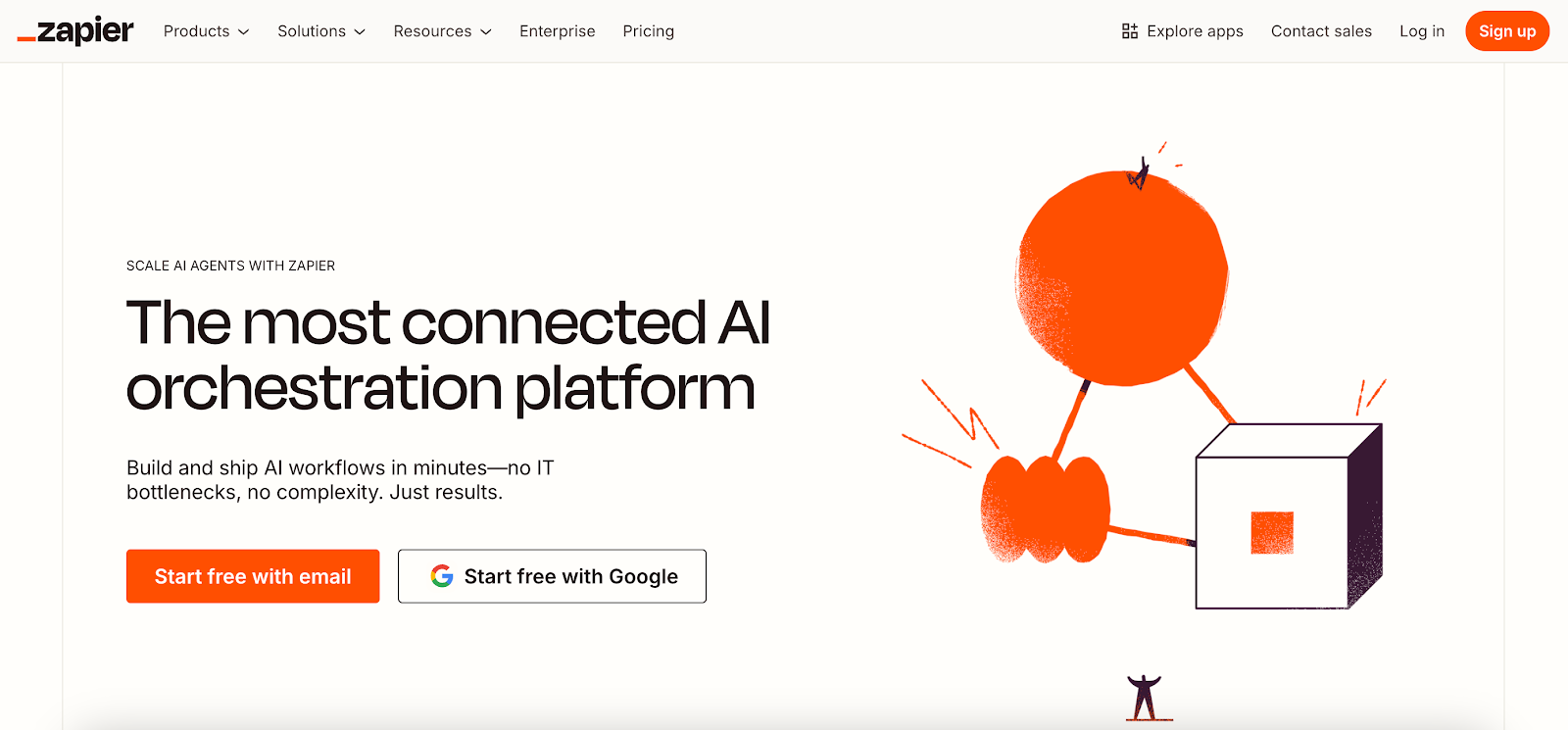
Once your systems are in place, you need them to sync. Zapier gives you the control to connect tools without relying on engineers or building custom integrations.
If you're using apps like Salesforce, Airtable, Dropbox, or Google Drive, Zapier helps sync data between them. You can route leads into your CRM, trigger Slack alerts, send follow-ups, or log meeting notes automatically.
Zapier also connects your essential VC tech stack and keeps operations tight behind the scenes. With fewer repetitive tasks to manage, your team can stay focused on sourcing deals and making faster investment decisions.
Key Features
- Over 6,000 app integrations across CRMs, file storage, calendars, and communication tools
- Workflow builder with filters, branching logic, and time delays
- AI-based automation features through Zapier Tables and AI field types
- Tools to automate document routing and e-signature tasks
- No-code interface with support for loops and sub-Zap workflows
- Notifications, data entry, and record updates across your deal management systems
Pros
You can connect your software solutions without dev resources. This helps your team move faster through the investment lifecycle and reduces time wasted on routine tasks.
Cons
Some of the more complex Zaps may need testing or workarounds. When automations fail, it can take time to figure out what went wrong unless you're comfortable with how the logic is set up.
Pricing Information
- Professional ($29.99/per month): Gives you AI-powered workflows and higher task volumes.
- Team ($103.50/per month): Adds shared folders, access controls, and usage reporting for larger VC teams.
- Enterprise (custom pricing): Scales automation across departments with single sign-on and priority support.
Layer Relationship Data Into Your VC Tech Stack
You’ve seen the tools that keep your fund running from diligence to scheduling to portfolio tracking. But without a reliable way to source through trusted networks, your outreach can stall before it starts.
Village helps VC firms turn passive contacts into active deal flow. It maps over 700 million professionals and syncs with your inbox and calendar to show you warm, ranked paths to founders, LPs, and co-investors. That means fewer cold emails and more meetings that move the needle.
Built for modern venture capital operations, Village integrates with CRMs, scores connection strength with AI, and supports opt-in workflows to help you focus on the most relevant investment opportunities.
Is your VC tech stack missing relationship visibility? Village fills that gap and helps your team make better strategic investment decisions.
Get started with Village for free!
FAQs About VC Tech Stack
What are VCs in tech?
In the context of the venture capital industry, VCs are investors who fund private technology companies, usually at the early stage. They often focus on sectors where they can predict market trends and help founders shape scalable business strategies.
Is VC a high-paying job?
Yes, especially at the partner level. Compensation usually includes salary, bonus, and carry (the share of profits from a venture capital fund). Junior roles offer lower base salaries but can still be lucrative, depending on firm size and fund performance.
What are the top 5 VCs in the US?
Names shift slightly year to year, but the most cited firms often include Sequoia Capital, Andreessen Horowitz, Benchmark, Accel, and Lightspeed. These firms are known for early access to high-growth startups and strong data analysis to support informed investment decisions.










